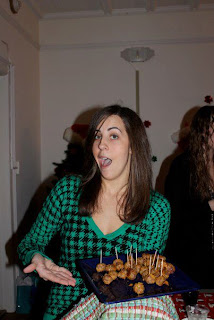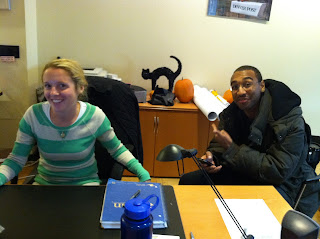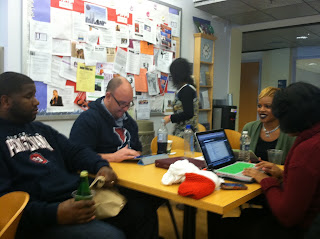Many historians perceive the increase in demand for college education amongst white middle class males in the 1920s as happening suddenly and without discernible cause (Clark, 2010). A college education, something that was thought to inhibit masculinity and be a hindrance to business success in the late nineteenth century, suddenly became highly sought after and connected to success in the twentieth century. By then, American cultural expectations had changed, but how did it happen? Daniel A. Clark sets out to determine what exactly caused the sudden college enrollment boom in his book, Creating The College Man: American Mass Magazines and Middle Class Manhood, 1890-1915. Clark finds that changing notions of white middle class masculinity moving into the twentieth century spurred greater interest in postsecondary educational attainment. In his words, “when the businessman who had long rejected the necessity of any formal education (who had even prided himself on his lack of education) accepted college as a rung on the ladder of success, something clearly had changed” (Clark, 2010, p. 5).
Creating the College Man traces the confluence of growing American middle class male anxiety in an unprecedented national forum, through four popular magazines whose readership was largely white, male and middle class. In an effort to understand how college became a viable path to middle class manhood for white protestant men, Clark scoured articles in Munsey’s, Cosmopolitan, The Saturday Evening Post and Collier’s published between 1890 – 1915 and tracked the subtle, gradual changes in representations of college educated males. Clark argues that imagined notions of masculinity -ones that existed only within the pages of these periodicals- were just as significant and perhaps more significant than the realities of white middle class masculinity at the turn of the century.
Clark calibrates his analysis to several historical themes of the turn of the century: industrialization, urbanization, changing immigration patterns and corporatization. He appropriately acknowledges that increased college enrollments were not necessarily or directly influenced by the pages of magazines alone, but rather by the larger cultural changes happening that are captured in the pages of popular magazines aimed at the middle class. These cultural changes allowed the concept of the self-made man, wildly popular in the stories published in these periodicals, to become compatible with a college education.
Clark is attentive throughout to the ways in which white native-born male protestant masculinity was framed in stark, fearful opposition to the identities of immigrants, non-protestants, working-class men and all women in order to exclude these groups from participation in the American middle class and establish postsecondary education as a vehicle for the perpetuation of white native-born American middle-class masculinity. He includes lengthy discussions of the idea that sending women to college was perceived as race suicide and of the ways in which white middle class men’s path to embracing college education as necessary had to do with highly racialized variations of Social Darwinist theory. Clark makes a compelling argument that the rising popularity of white college athletics in the pages of these publications was, in part, an effort to reinvigorate troubled white Anglo-Saxan masculinity. Interestingly, Clark does not consider sexual orientation.
Daniel Clark uses a unique, practical approach to history that knows no disciplinary bounds. His analysis draws from history, philosophy, education, critical theory, media studies, sociology and psychology. Clark does not acknowledge the historiography that informed his work, though it is clear that at least one work has done so. Creating The Modern Man: American Magazines and Consumer Culture, 1900-1950 by Tom Pendergast, written ten years prior, posits many of the same arguments. In terms of chronology, however, Pendergast essentially begins his analysis where Clark ends his. According to Pendergast, the stories contained in magazines like Munsey’s and The Saturday Evening Post, magazines that Clark also uses in his analysis, “contain the traces of changing cultural notions of masculinity and the anxiety men felt about their changing role in culture, yet they also serve to reinforce and conserve late-nineteenth century notions of manhood . . .” (Pendergast, 2005, p. 43). With notions like this, Pendergast and Clark identify how magazines guided men through new webs of economic relations as America moved from an old, Victorian cultural orientation to embrace a new, emerging corporate sensibility. Clark takes the analysis a step further by investigating how this altered the place and perception of college education.
The specificity of Clark’s work differentiates it from more general works, such as Brutes in Suits by John Pettegrew and National Manhood: Capitalist Citizenship and the Imagined Fraternity of White Men by Dana D. Nelson. Both of those works cover broader historical periods and trace out the development of new white masculinities for the twentieth century using literature and scholarship from the time as well as economic and cultural developments.
Daniel Clark’s Creating the College Man is a welcome supplement to the literature on historical conceptions of masculinity in higher education. Many other works describe masculinity within Greek organizations, such as The Company He Keeps: A History of White College Fraternities by Nicholas L. Syrett and The Lost Boys of Zeta Psi: A Historical Archaeology of Masculinity at a University Fraternity by Laura Wilkie. Others focus on cultural formulations of masculinity within the broader student body, such as Paul R. Deslandes’ Oxbridge Men: British Masculinity and the Undergraduate Experience, 1850-1920 and Robert F. Pace’s Halls of Honor: College Men in the Old South. Clark adds the unique perspective of privileged onlookers to capture the thoughts of men who were not in college to reach the answers to bigger questions: did the status of those with a college education change over this period and did it affect commercial success? What Clark’s approach reveals is that the answer to these questions changed over time. What was in the late-nineteenth century seen as frivolous and perhaps even detrimental suddenly became connected to prevailing notions of white middle class male success. All of the works focus on notions of white middle or upper-middle class manhood and do a relatively good job or better at acknowledging how vital exclusionary notions of masculinity were at propping up white masculinity; all of the aforementioned authors include this discussion in their analysis. Creating the College Man is less concerned with the factual elements of any lived college experience and more concerned with the realm of ideas and understandings about what a college education might signify and entail for people not actually enrolled in college. How was a college education perceived in white male middle class social circles? Clark’s history is eloquent, abstract, original and at times, repetitive. At certain points, this hurt the readability of the book. His attempt to organize the chapters thematically is convoluted. The content over several chapters overlaps too much and the overall arc becomes somewhat muddled. His arguments are strong, interesting and relevant, but difficult to disentangle. Creating the Modern Man makes a lot of the same arguments in a much more concise and direct manner.
If revised for clarity, this work could secure a central place in higher education historiography because of its one of a kind approach to white middle class manhood in one of the most transformative periods of American higher education history. Clark’s enthusiastic and insightful book does ultimately deliver upon his promise to “illuminate the origins of the place of college education in modern American life” (Clark, 2010, p. 184).
Reference List
Clark, D. A. (2010) Creating the college man: American mass magazines and middle class manhood, 1890-1915. Madison: TheUniversity of Wisconsin Press.
Deslandes, P.R. (2005). Oxbridge men: British masculinity and the undergraduate experience, 1850-1920. Bloomington & Indianapolis: University of Indiana Press.
Nelson, D. D. (1998). National manhood: Capitalist citizenship and the imagined fraternity of white men. Durham: Duke University Press.
Pace. R.F. (2004). Halls of honor: College men in the old south. Baton Rouge: Louisiana State University Press.
Pendergast, T. (2000). Creating the modern man: American magazines and consumer culture, 1900-1950. Columbia: The University of Missouri Press.
Pettegrw, J. (2007). Brutes in suits: Male sensibility in America, 1890-1920. Baltimore: The Johns Hopkins Press.
Syrett,N. (2011). The company he keeps: A History of white college fraternities. Chapel Hill: The University of North Carolina Press.
Wilkie, L.A. (2010). The lost boys of Zeta Psi: A historical archaeology of masculinity at a university fraternity. Berkeley: The University of California Press.




















